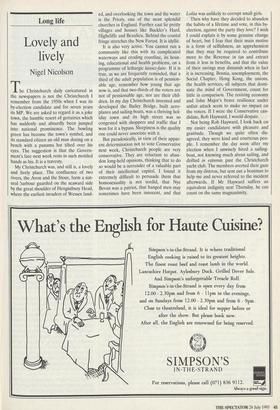Long life
Lovely and lively
Nigel Nicolson
The Christchurch daily caricatured in the newspapers is not the Christchurch I remember from the 1950s when I was its by-election candidate and for seven years its MP. We are asked to regard it as a joke town, the humble resort of geriatrics which has suddenly and absurdly been jumped into national prominence. The bowling green has become the town's symbol, and its standard citizen an old man dozing on a bench with a panama hat tilted over his eyes. The suggestion is that the Govern- ment's fate next week rests in such mottled hands as his. It is a travesty.
My Christchurch was, and still is, a lovely and lively place. The confluence of two rivers, the Avon and the Stour, form a nat- ural harbour guarded on the seaward side by the great shoulder of Hengistbury Head, where the earliest invaders of Wessex land- ed, and overlooking the town and the water is the Priory, one of the most splendid churches in England. Further east lie pretty villages and houses like Buckler's Hard, Highcliffe and Beaulieu. Behind the coastal fringe stretches the New Forest. It is idyllic.
It is also very active. You cannot run a community like this with its complicated waterways and eroding coastline, its hous- ing, educational and health problems, on a programme of lethargic laissez-faire. If it is true, as we are frequently reminded, that a third of the adult population is of pension- able age, remember how young that age now is, and that two-thirds of the voters are not of pensionable age, nor are their chil- dren. In my day Christchurch invented and developed the Bailey Bridge, built aero- planes and sailing-boats, was a thriving hol- iday town and its high street was so congested with shoppers and traffic that I won for it a bypass. Sleepiness is the quality one could never associate with it.
But paradoxically, in view of their appar- ent determination not to vote Conservative next week, Christchurch people are very conservative. They are reluctant to aban- don long-held opinions, thinking that to do so would be a surrender of a valuable part of their intellectual capital. I found it extremely difficult to persuade them that homosexuality is not sordid, that Nye Bevan was a patriot, that hanged men may sometimes have been innocent, and that Lolita was unlikely to corrupt small girls.
Then why have they decided to abandon the habits of a lifetime and vote, in this by- election, against the party they love? I wish I could explain it by some genuine change of heart, but I fear that their main motive is a form of selfishness, an apprehension that they may be required to contribute more to the Revenue in tax and extract from it less in benefits, and that the value of their savings may diminish when in fact it is increasing. Bosnia, unemployment, the Social Chapter, Hong Kong, the unions, the health services, all subjects that domi- nate the mind of Government, count for little in comparison. The reviving economy and John Major's brave resilience under unfair attack seem to make no impact on the voters. If I were the Conservative can- didate, Rob Hayward, I would despair.
Not being Rob Hayward, I look back on my easier candidature with pleasure and gratitude. Though we quite often dis- agreed, they were kind and courteous peo- ple. I remember the day soon after my election when I unwisely hired a sailing- boat, not knowing much about sailing, and drifted in extremis past the Christchurch yacht club. The members averted their gaze from my distress, but sent out a boatman to help me and never referred to the incident afterwards. If Mr Hayward suffers an equivalent indignity next Thursday, he can count on the same magnanimity.


















































 Previous page
Previous page